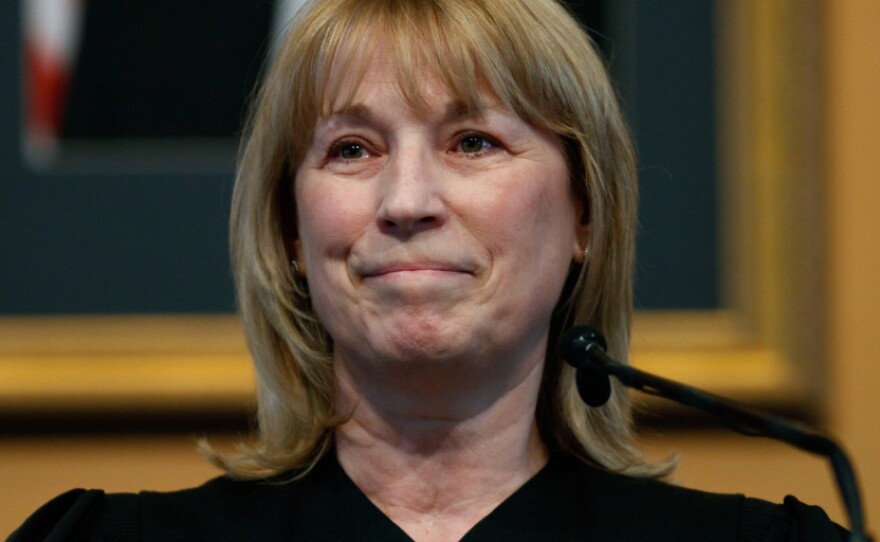A heated campaign is under way in Iowa, where conservatives hope to unseat three of the state's Supreme Court justices following a ruling last year that cleared the way for same-sex marriage.
Judges in Iowa are appointed, not elected. And the periodic "yes or no" ballot questions on whether to keep them on the bench are usually low-key affairs. But in several states, anger over recent court decisions is turning the normally sleepy judicial elections -- known as retention votes -- into pitched battles.
'We're Watching'
In a cavernous exhibit hall at the State Fairgrounds, the Iowa Christian Alliance is holding its annual convention to rally religious conservatives. Activist Barb Heki is handing out yard signs that read "Vote no to activist judges."
"We greatly underestimated the demand. People have taken stacks of them," Heki says.
Conservatives like Heki who oppose the Iowa Supreme Court's ruling on same-sex marriage are furiously organizing voters to check "no" on their ballots when they're asked if three of the justices should keep their jobs. It's like any other modern political campaign. But what's new is that the targets are appointed judges who routinely stay on the bench without the indignities of politicking.
Campaign chairman Bob Vander Plaats argues that these justices ignored the will of the people, who now have a chance to be heard. "This is a way to vent their frustration, vote no, and let the courts know that we're watching and we're willing to hold you in check," Vander Plaats says.
Vander Plaats says conservatives want to send a message to judges that their jobs could be on the line if they throw out popular laws.
This urge to strike back at judges is catching on in other states as well. A study by Adam Skaggs at New York University Law School shows retention elections are turning out to be more hotly contested this year than in the past decade.
"And I think what we're seeing, in a couple of states at least, is outside groups getting involved, really striking the same partisan terms that we've seen in traditional political races," Skaggs says.
In addition to the Iowa battle, anti-abortion activists are campaigning to recall a justice in Kansas, where a similar nonpolitical merit system has held sway. The same thing is happening in Colorado, where three justices are being targeted for rulings on tax issues.
Justices Go Low Key
In Iowa, the justices are taking the high road, declining to form campaign committees or raise money to urge a yes vote. One of the targeted justices, David Baker, says they want to avoid any suggestion that future rulings could be affected by campaign donations.
"We fully understand this course of action may not be the smartest move politically," Baker says.
So instead of a well-funded "vote yes" campaign, justices and their allies are lecturing on the value of a nonpolitical judiciary.
"Before you vote in the retention elections this year, reflect on the rule of law and the need for impartial justice for all, free of politics and free of special interests," another target, Chief Justice Marsha Ternus, recently told college students in Dubuque.
But that low-key approach may not carry the day. Dennis Goldford, who teaches politics at Drake University, says angry people are often motivated to vote.
"And in this particular case, they're focused on a particular decision and angry about it. The other side's focusing on an independent judiciary. It's hard to get impassioned about that," Goldford says.
And polls seem to bear that out. The most recent Des Moines Register survey shows that the referendum on the justices, which in normal years might pass overwhelmingly, is now a tossup.
Joyce Russell reports for Iowa Public Radio.
Copyright 2022 Iowa Public Radio. To see more, visit Iowa Public Radio. 9(MDAzMjM2NDYzMDEyMzc1Njk5NjAxNzY3OQ001))





